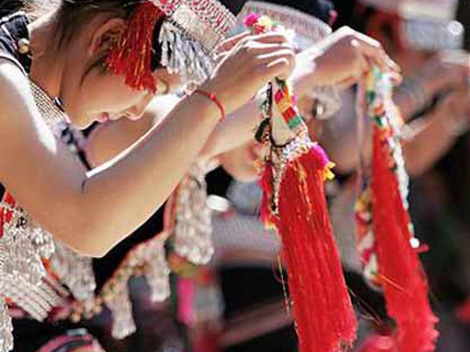more>>More News
- National Day
- ways to integrate into Chinese style life
- Should they be in the same university with me?!!
- Chinese Ping Pang Legend: the Sun Will Never Set
- A Glance of those Funny University Associations
- mahjong----The game of a brand new sexy
- Magpie Festival
- Park Shares Zongzi for Dragon Boat Festival
- Yue Fei —— Great Hero
- Mei Lanfang——Master of Peking Opera
Fishpond Jacquard Webbing Belts in China
By admin on 2014-12-23
There are many distinctive marriage customs of the Hua Yao Dai People, an ethnic minority mainly distributed in the Yunnan Province of China. These marriage customs are very attractive, as many people have never heard of them.
The bride and groom set an auspicious day for the marriage ceremony after discussing the necessities of the ceremony. As early as the morning of the wedding day, the groom's family and friends begin to butcher cattle and pigs and prepare vegetables for the feast. Then after lunch, the groom and the groomsmen, as well as the cooks and some young helpers, set off with beef, pork and wine on their shoulders in a long line majestically. They are going to the bride's home to treat her and her friends. As soon as they get there, several little girls (called "Xiao Bo Shao" in Hua Yao Dai People) standing on the house will splash auspicious water to welcome them. Then the old people lead the cooks and the helpers to cook dishes. One member of each family in the village will attend the feast with his or her own tasty dishes.
Hua Yao Dai People usually holds their marriage ceremonies at midnight. At dusk, the matchmaker and two middle-aged women who know the marriage ceremony well, leading a group of people, start off to the bride's home to receive her. The bride's parents who have been waiting at the gate will propose a toast to them. The matchmaker and the two women raise a bowl filled with wine above head and splash the wine on the ground to toast the ancestors first. Then after the second toast, they enter the house to have dinner. The little girls frequently pour wine for them and the bride's party toasts them with their wine. Then the bride, followed by the groom holds a flagon, starts to make toasts to the elders and the group. Finally the couple get down on their knees before their parents who propose them a farewell toast. The mother shows she is attached to her daughter very much and the daughter shows her gratefulness to her mother for giving birth to her. They hold arms and cry, reluctant to depart from each other. After being pulled away by others, the bride is taken outside of the gate and then leaves. If there is a river on the way back, it is a must for the bridegroom to take his wife on his back to cross it.
The groom's mother and some elders have been waiting for the couple at the gate. With the nice sound of silver rings, the bride, supported by eight little girls, arrive at the gate. The mother-in-law walks up immediately and put a bamboo hat called "Ji Cong Dou Li" on her head. The little girls turn the hat deliberately and then the mother-in-law makes it right. They will do this several times, which means developing the mutual understanding between the mother-in-law and the daughter-in-law. Led by her mother-in-law, the bride enters the stall to feed the cattle. A story is going about that the cattle and the Dai People work hard on the farm together. The cattle eat grass, while the Dai People eat grain, so they worship the cattle and treat them as a totem.
The solemn and national-featured marriage ceremony is held at the gate. An old woman, with a candle in her hand, goes around the bride three circles to drive away the evil spirits along with the road. Two old women fasten a thread to the couple, which means a steady marriage. After the groom steps his left foot on the doorsill and the bride steps her right foot on his, the old women takes a candle over to their feet and then puts out the fire, which means they will go through fire and water and stay together forever. After that, the couple eat a glutinous rice ball dyed with yolk and they drink with crossed arms, which means they will gain bullion and silver through collective hard work. Then the couple go to the main hall to see their parents and the party. At the middle of the bridal chamber, there is a retort full of hot glutinous rice, and at the middle of the rice is a saw tooth hook. Under the guidance of the old women, the couple take the rice from one side and give it to their parents respectfully to eat first. Then they change their places and eat the rice themselves. This kind of action shows the traditional virtues of respecting old people, being equal between men and women, and sharing happiness with each other.
Fishpond Jacquard Webbing Belts in
China 
- Contact Us
-
Tel:
0086-571-88165708
0086-571-88165512E-mail:
admission@cuecc.com
- About Us
- Who We Are What we do Why CUECC How to Apply
- Address
- Study in China TESOL in China
Hangzhou Jiaoyu Science and Technology Co.LTD.
Copyright 2003-2024, All rights reserved




 Chinese
Chinese
 English
English
 Korean
Korean
 Japanese
Japanese
 French
French
 Russian
Russian
 Vietnamese
Vietnamese
